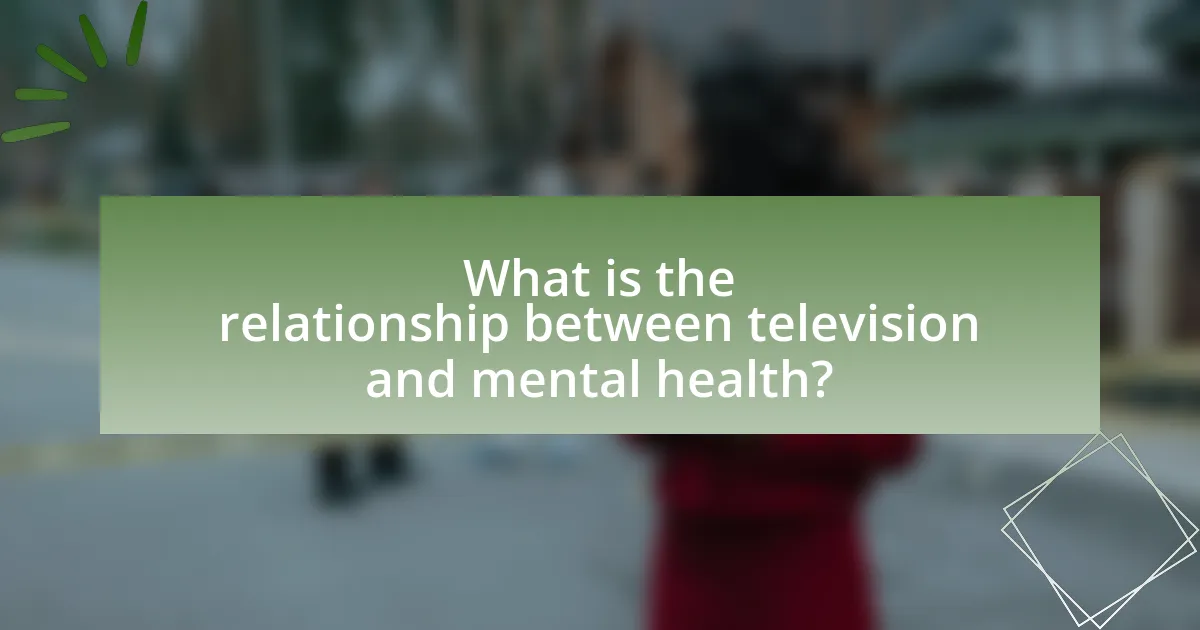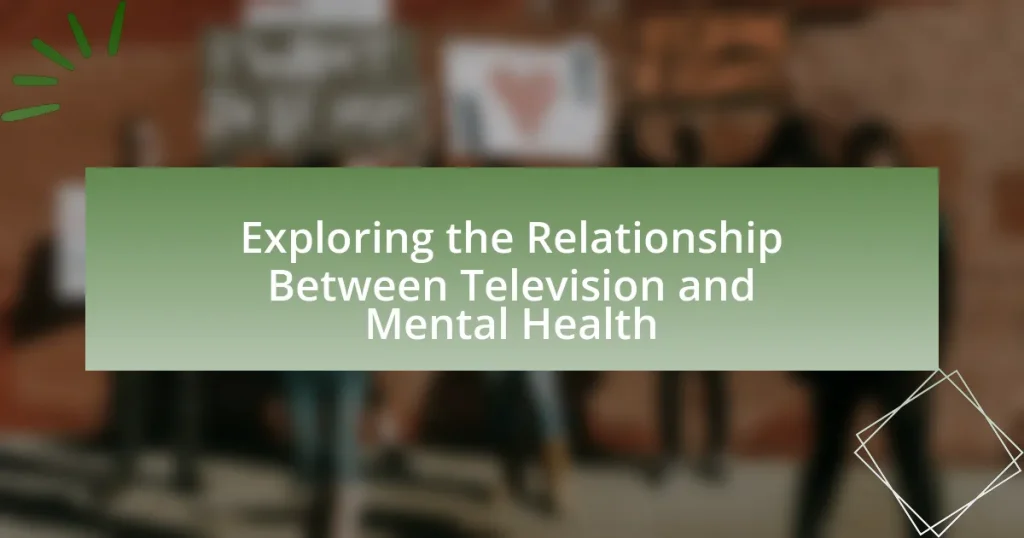The article explores the complex relationship between television and mental health, highlighting both positive and negative impacts. It discusses how television consumption can influence mood, behavior, and cognitive function, with excessive viewing linked to increased anxiety, depression, and social isolation. The article also examines the effects of different content types on viewers’ emotions, the implications of viewing trends on mental health statistics, and strategies for healthier viewing habits. Additionally, it emphasizes the importance of studying television’s role in shaping public perceptions of mental health and the need for future research to address existing gaps in understanding this relationship.

What is the relationship between television and mental health?
Television can significantly impact mental health, both positively and negatively. On one hand, engaging with television can provide entertainment, relaxation, and a sense of connection, which may alleviate stress and improve mood. Conversely, excessive television consumption has been linked to increased anxiety, depression, and social isolation. Research published in the journal “Psychological Science” indicates that individuals who spend more than three hours a day watching television are at a higher risk for developing mental health issues. This duality highlights the importance of moderation and content choice in television viewing habits.
How does television consumption impact mental health?
Television consumption significantly impacts mental health by influencing mood, behavior, and cognitive function. Excessive viewing can lead to increased feelings of anxiety and depression, as studies have shown that individuals who watch more than three hours of television daily report higher levels of these mental health issues. For instance, research published in the journal “Psychological Medicine” found a correlation between high television consumption and increased depressive symptoms among adults. Additionally, exposure to violent or distressing content can exacerbate stress and anxiety levels, further affecting mental well-being.
What are the psychological effects of watching television?
Watching television can lead to various psychological effects, including increased anxiety, depression, and desensitization to violence. Research indicates that excessive television viewing is associated with higher levels of anxiety and depression, particularly among adolescents. A study published in the journal “Psychological Science” found that individuals who consume more media content, especially violent programming, exhibit increased aggressive thoughts and behaviors, demonstrating desensitization to violence. Furthermore, prolonged exposure to negative news can contribute to feelings of helplessness and stress, impacting overall mental well-being.
How does the content of television programs influence viewers’ emotions?
The content of television programs significantly influences viewers’ emotions by eliciting specific emotional responses through narrative, character development, and visual imagery. For instance, dramatic storylines can evoke feelings of sadness or empathy, while comedic content often induces laughter and joy. Research indicates that emotional engagement with television content can lead to mood regulation; a study published in the Journal of Broadcasting & Electronic Media found that viewers often use television as a tool for emotional escape, enhancing their mood or providing comfort during distressing times. This demonstrates that the emotional tone and themes presented in television programs directly affect viewers’ emotional states and overall mental health.
Why is it important to study the effects of television on mental health?
Studying the effects of television on mental health is important because television consumption can significantly influence emotional well-being and behavior. Research indicates that excessive television viewing is associated with increased risks of anxiety, depression, and social isolation. For instance, a study published in the journal “Psychological Medicine” found that individuals who watch more than three hours of television daily are more likely to report symptoms of depression compared to those who watch less. Understanding these effects helps in developing strategies to mitigate negative outcomes and promote healthier viewing habits, ultimately contributing to better mental health outcomes in the population.
What trends in television viewing have emerged in recent years?
Recent years have seen a significant shift in television viewing trends, characterized by the rise of streaming services and on-demand content. This transition has led to a decline in traditional cable subscriptions, with a 2022 report indicating that U.S. cable TV subscriptions dropped by approximately 25% since 2015. Additionally, viewers increasingly prefer binge-watching entire seasons of shows, with platforms like Netflix reporting that 70% of their subscribers engage in this behavior. The trend towards mobile viewing has also emerged, with a 2021 survey revealing that 60% of viewers watch television on smartphones or tablets. These trends reflect changing consumer preferences and have implications for mental health, as binge-watching and screen time can influence emotional well-being.
How do these trends correlate with mental health statistics?
Trends in television consumption, particularly increased screen time and exposure to negative content, correlate with rising mental health statistics, including higher rates of anxiety and depression. Research indicates that excessive television viewing can lead to social isolation and reduced physical activity, both of which are linked to poorer mental health outcomes. For instance, a study published in the Journal of Health Psychology found that individuals who watched more than three hours of television daily reported significantly higher levels of depressive symptoms compared to those who watched less. Additionally, exposure to distressing news content has been shown to contribute to heightened anxiety levels, as evidenced by a survey conducted by the American Psychological Association, which revealed that 56% of respondents felt overwhelmed by the news, impacting their mental well-being.
What are the potential risks associated with excessive television watching?
Excessive television watching poses several potential risks, including increased sedentary behavior, which can lead to obesity and related health issues. Research indicates that prolonged screen time is associated with a higher risk of developing cardiovascular diseases and type 2 diabetes due to physical inactivity. Additionally, excessive television consumption can negatively impact mental health, contributing to anxiety and depression. A study published in the journal “JAMA Psychiatry” found that individuals who watch more than three hours of television daily are at a greater risk of experiencing depressive symptoms. Furthermore, excessive viewing can disrupt sleep patterns, leading to insomnia and decreased overall well-being.
How can binge-watching affect mental well-being?
Binge-watching can negatively affect mental well-being by contributing to increased feelings of anxiety and depression. Research indicates that excessive screen time, particularly through binge-watching, is associated with a sedentary lifestyle, which can lead to physical health issues that further exacerbate mental health problems. A study published in the journal “Psychological Science” found that individuals who engage in binge-watching report higher levels of loneliness and social isolation, as they may prioritize screen time over real-life social interactions. Additionally, the constant exposure to dramatic or distressing content can heighten emotional distress and lead to sleep disturbances, further impacting mental health.
What role does screen time play in anxiety and depression?
Screen time significantly contributes to anxiety and depression by increasing feelings of isolation and reducing physical activity. Research indicates that excessive screen time, particularly on social media, correlates with higher levels of anxiety and depressive symptoms among adolescents and adults. A study published in the journal “Preventive Medicine Reports” found that individuals who spent more than three hours per day on screens reported increased mental health issues, highlighting the negative impact of prolonged exposure to digital environments.

How can television be used positively for mental health?
Television can be used positively for mental health by providing educational content, promoting relaxation, and fostering social connections. Educational programs can enhance knowledge and awareness about mental health issues, as seen in documentaries and talk shows that discuss mental health topics, which can reduce stigma and encourage viewers to seek help. Relaxation is facilitated through entertainment, such as comedies and nature shows, which can lower stress levels; studies indicate that watching humorous content can lead to increased endorphin levels, promoting a sense of well-being. Additionally, television can foster social connections by serving as a shared experience among friends and family, which can enhance feelings of belonging and support. Research shows that engaging in discussions about television shows can strengthen interpersonal relationships, contributing positively to mental health.
What therapeutic benefits can television provide?
Television can provide therapeutic benefits such as emotional relief, social connection, and cognitive engagement. Watching television can serve as a form of escapism, allowing individuals to temporarily distance themselves from stressors and experience emotional catharsis through storytelling. Research indicates that engaging with relatable characters and narratives can foster a sense of connection, reducing feelings of loneliness and isolation. Additionally, educational programs can stimulate cognitive functions, enhancing knowledge and critical thinking skills. Studies have shown that specific genres, such as comedies, can elevate mood and promote laughter, which is linked to improved mental health outcomes.
How can specific genres of television aid in mental health recovery?
Specific genres of television, such as comedies and dramas, can aid in mental health recovery by providing emotional relief and fostering connection. Comedies can induce laughter, which has been shown to reduce stress and improve mood, while dramas can facilitate emotional catharsis, allowing viewers to process their feelings through relatable narratives. Research indicates that engaging with these genres can lead to increased feelings of empathy and social connectedness, which are crucial for mental health recovery. For instance, a study published in the Journal of Health Psychology found that watching uplifting television content can significantly enhance mood and decrease symptoms of anxiety and depression.
What role do documentaries and educational programs play in mental health awareness?
Documentaries and educational programs significantly enhance mental health awareness by providing accurate information and personal narratives that destigmatize mental health issues. These visual mediums educate the public on various mental health conditions, treatment options, and the importance of seeking help, thereby fostering a more informed society. For instance, a study published in the Journal of Health Communication found that exposure to mental health documentaries increased viewers’ knowledge and reduced stigma associated with mental illness. By presenting real-life stories and expert insights, these programs encourage open discussions about mental health, ultimately promoting empathy and understanding within communities.
How can viewers make healthier choices regarding television consumption?
Viewers can make healthier choices regarding television consumption by setting specific limits on screen time and selecting content that promotes positive mental health. Research indicates that excessive television viewing is linked to increased feelings of depression and anxiety, while engaging with uplifting or educational programming can enhance mood and cognitive function. For instance, a study published in the Journal of Health Psychology found that individuals who watched positive content reported lower stress levels compared to those who consumed negative or violent media. By consciously choosing what to watch and how long to watch, viewers can significantly improve their mental well-being.
What strategies can help balance television viewing with mental health needs?
To balance television viewing with mental health needs, individuals can implement strategies such as setting time limits on viewing, choosing educational or uplifting content, and scheduling regular breaks. Research indicates that excessive television consumption can lead to negative mental health outcomes, including increased anxiety and depression. For instance, a study published in the Journal of Health Psychology found that individuals who watched more than three hours of television daily reported higher levels of psychological distress. By consciously managing viewing habits and selecting content that promotes well-being, individuals can mitigate these risks and support their mental health effectively.
How can viewers select content that promotes positive mental health?
Viewers can select content that promotes positive mental health by choosing programs that emphasize uplifting themes, resilience, and emotional well-being. Research indicates that engaging with positive narratives can enhance mood and foster a sense of connection, as shown in a study published in the Journal of Positive Psychology, which found that individuals who watched uplifting content reported higher levels of happiness and lower levels of stress. Additionally, viewers should seek out content that includes diverse perspectives and promotes empathy, as these elements contribute to a more supportive viewing experience.

What are the implications of television on societal mental health trends?
Television significantly influences societal mental health trends by shaping perceptions, behaviors, and emotional responses. Research indicates that excessive television viewing correlates with increased rates of anxiety, depression, and social isolation. For instance, a study published in the journal “Psychological Science” found that individuals who consume high amounts of television are more likely to report feelings of loneliness and dissatisfaction with life. Furthermore, exposure to negative portrayals of mental health issues can perpetuate stigma and misinformation, impacting public attitudes and reducing the likelihood of individuals seeking help. Thus, television serves as both a reflection of and a contributor to societal mental health trends, affecting viewers’ psychological well-being and societal perceptions of mental health.
How does television shape public perceptions of mental health?
Television shapes public perceptions of mental health by influencing societal attitudes and understanding through its portrayal of mental health issues. For instance, shows that depict characters with mental illnesses often contribute to either stigma or empathy, depending on the accuracy and sensitivity of the representation. Research indicates that positive portrayals can lead to increased awareness and reduced stigma; a study published in the journal “Psychological Medicine” found that exposure to accurate media representations of mental health can improve public attitudes towards individuals with mental health conditions. Conversely, negative or sensationalized portrayals can perpetuate stereotypes and misinformation, leading to fear and misunderstanding. Thus, television serves as a powerful medium that can either enhance or hinder public perceptions of mental health based on its content.
What impact do portrayals of mental illness in media have on stigma?
Portrayals of mental illness in media significantly impact stigma by shaping public perceptions and attitudes. Positive and accurate representations can reduce stigma by fostering understanding and empathy, while negative or sensationalized depictions often reinforce harmful stereotypes and misconceptions. Research indicates that exposure to negative portrayals can lead to increased fear and avoidance of individuals with mental health conditions, as evidenced by a study published in the journal “Psychological Medicine,” which found that media portrayals contribute to public stigma and discrimination against those with mental illnesses. Conversely, initiatives promoting accurate and compassionate representations in media have been shown to improve attitudes and reduce stigma, highlighting the critical role of media in influencing societal views on mental health.
How can television campaigns promote mental health awareness?
Television campaigns can promote mental health awareness by disseminating accurate information, reducing stigma, and encouraging help-seeking behavior. These campaigns often feature relatable narratives and testimonials that resonate with viewers, making mental health issues more accessible and understandable. For instance, a study published in the journal “Health Communication” found that media portrayals of mental health can significantly influence public perceptions and attitudes, leading to increased empathy and support for individuals facing mental health challenges. By utilizing engaging storytelling and expert endorsements, television campaigns can effectively educate the audience about mental health resources and the importance of mental well-being.
What future research is needed to understand the television-mental health relationship?
Future research needed to understand the television-mental health relationship includes longitudinal studies that track the impact of television consumption on mental health over time. Such studies can provide insights into causality rather than mere correlation. Additionally, research should focus on the content of television programs, examining how different genres, themes, and portrayals of mental health influence viewers’ psychological well-being. For instance, studies like the one conducted by Primack et al. (2017) in the American Journal of Preventive Medicine highlight the need for understanding how specific content can affect anxiety and depression levels. Furthermore, exploring demographic variables such as age, gender, and socio-economic status in relation to television viewing habits and mental health outcomes is essential for a comprehensive understanding of this relationship.
What gaps exist in current studies on television and mental health?
Current studies on television and mental health exhibit significant gaps, particularly in longitudinal research and diverse demographic representation. Longitudinal studies are scarce, limiting the understanding of long-term effects of television consumption on mental health outcomes. Additionally, existing research often focuses on specific age groups or cultural backgrounds, neglecting the experiences of various populations, such as older adults or marginalized communities. This lack of diversity in study samples can lead to incomplete conclusions about the relationship between television and mental health across different societal contexts. Furthermore, there is insufficient exploration of the impact of different genres and content types on mental health, which could provide deeper insights into how specific television programming influences psychological well-being.
How can interdisciplinary approaches enhance understanding of this relationship?
Interdisciplinary approaches can enhance understanding of the relationship between television and mental health by integrating insights from psychology, media studies, and sociology. For instance, psychology provides frameworks for understanding how television content influences emotional responses and behavior, while media studies analyze the impact of media consumption patterns on societal norms and individual perceptions. Sociology contributes by examining the broader social contexts in which television is consumed, including cultural influences and community dynamics. Research, such as the study by Primack et al. (2017) published in the American Journal of Preventive Medicine, demonstrates that increased television viewing is associated with higher levels of depression and anxiety, highlighting the need for a multifaceted approach to fully grasp the complexities of this relationship.
What practical tips can help viewers maintain a healthy relationship with television?
To maintain a healthy relationship with television, viewers should establish clear viewing limits. Setting specific time frames for watching television can prevent excessive consumption, which studies show is linked to negative mental health outcomes, such as increased anxiety and depression. Additionally, viewers should prioritize content that is uplifting or educational, as research indicates that positive programming can enhance mood and promote well-being. Engaging in active viewing, where individuals discuss or reflect on what they watch, can also foster critical thinking and reduce passive consumption. Lastly, incorporating regular breaks during viewing sessions helps mitigate the risks of prolonged screen time, which has been associated with sedentary behavior and its related health issues.




